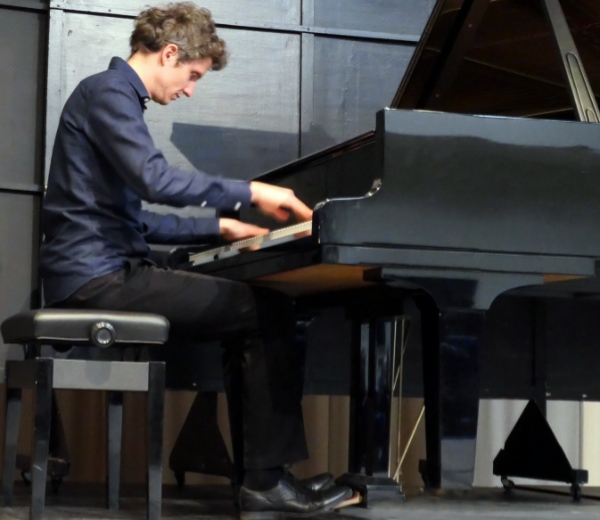| Bach | Partita No. 1 in B-Flat Major BWV 825 |
| Schubert | Valses nobles D 969 |
| Ravel | Valses nobles et sentimentales |
| Chopin | 2 Nocturnes - Op.9 No. 1, Op. 27 No. 2 |
| Schumann | Carnaval op. 9 |

Friday night’s NYS audience enjoyed a splendid programme of virtuoso suites for solo piano performed by Hungarian pianist Zoltán Fejérvári,
In the first half of the recital the suites ranged from the Baroque dance forms of Bach’s Partita no.1 in B flat (published in 1731), played with admirable clarity and rhythmic vitality, via the Classical style of Schubert’s “Valse Nobles” (composed c.1827), to the early 20th century style of Ravel’s “Valse nobles et sentimentales” composed in 1911. The Schubert, a collection of 12 short miniatures all in 3:4 waltz time, was finely portrayed with its contrasting moods, tonalities and dynamics.The Ravel, comprising seven distinct waltzes rounded off by an 8th in the form of an epilogue, then took us on a colourful, surging, powerfully-rendered emotional journey. Ravel was of course no stranger to the dance and he also created this work in an orchestral version for the ballet.
The Romantic style was beautifully represented in the second half by Chopin and Schumann, both born in 1810. Two much-loved Chopin Nocturnes, Opus 9 no.1 and Opus 27 no.2 were poetically played, yet with amazing virtuosity. Then Schumann’s “Carnaval” (composed in 1834-35) is a set of 21 character pieces portraying 'the people, situations, moods and dances that one might encounter at a grand ball or Carnaval'. These are characters, both real and imagined, from Schumann’s own life, and include his future wife Clara, friends Chopin and Paganini and several characters from the Italian Commedia dell Arte, as well as the dual aspects of his own musical personality, the dreamy Eusebius and the passionate Florestan. (Could this work perhaps be the inspiration for Elgar’s Enigma Variations?) We were fortunate indeed to hear the whole of this challenging, wonderfully varied and colourful work performed with such masterly control and impeccable musicality.
The enthusiastic applause of the audience was generously rewarded with an encore in a completely different style, a piece from Fejérvári’s solo debut (2019) recording Janacek, "Frýdecká panna Maria" (The Madonna of Frydek) from Janáček's “On the Overgrown Path”; it was a touching finale to a memorable recital given by one of the most intriguing pianists of the newest generation of Hungarian musicians.
Reviewer: Cynthia Eraut
Photographer: David James